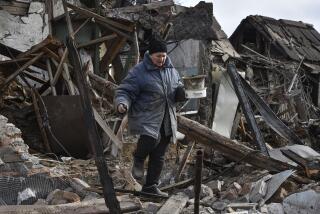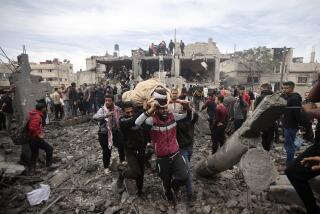NEWS ANALYSIS : Threat of Air Power in Bosnia Remains Grounded : Balkans: The U.N. chief’s conditions for giving NATO the go-ahead are so stiff the order may never come. The rattling of sabers baffles observers.
- Share via
SARAJEVO, Bosnia-Herzegovina — In plain English, these are the conditions set by U.N. Secretary General Boutros Boutros-Ghali for using NATO air power in Bosnia to relieve U.N. troops trapped in Srebrenica and to open Tuzla airport for humanitarian aid flights:
* If there is no reason for the North Atlantic Treaty Organization or the U.N. Protection Force here to fear retaliation by the targeted Serbs, who have besieged Bosnia-Herzegovina for 22 months and are better armed than the U.N. peacekeepers.
* If several thousand more U.N. ground troops are deployed to Bosnia first to defend those already vulnerable to a hostile reaction--an expansion of the operation that would take weeks if not months to complete.
In other words, the purported authorization for close NATO air support and possible air strikes varies little from the United Nations’ longstanding approach of trying to feed and care for what remains of Bosnia’s population while the war that has made them victims is left to burn on.
Aid officials and U.N. sources say they are baffled by the verbal saber-rattling, which has provoked bellicose warnings from Bosnian Serb leaders while offering no real prospects for resolving the ever more intractable war.
The 12,000 U.N. troops currently deployed in Bosnia are assigned to escort aid convoys across ubiquitous roadblocks and a meandering 1,000-mile-long series of front lines that cut through this country like a jigsaw.
The lightly armed U.N. forces are mostly tolerated by the warring factions, because they are neutral and because the food convoys they protect are sustaining Bosnians of all ethnic backgrounds.
“If the mission were to lose its humanitarian character, the prevailing sentiment is that the ground troops and the aid agencies would have to pull out,” said one official of the Office of the U.N. High Commissioner for Refugees.
But he conceded that the refugee agency’s success rate in getting food to hungry civilians has suffered tremendously this winter, with increasing attempts by all combatants to prevent aid from getting through to rival populations.
Officials of the U.N. refugee agency report that only about 20% of the starvation ration they were attempting to get through to Muslim communities in central Bosnia actually reached its target in December and early January.
U.N. military and administrative sources complain that the renewed threats of NATO force are probably unnecessary to achieve the Srebrenica troop rotation and that they are irrelevant regarding Tuzla airport, because the U.N. Protection Force has neither the soldiers nor the equipment to operate an airlift there like the one that feeds 380,000 in Sarajevo.
Bosnian Serb leader Radovan Karadzic has already conceded some ground in the Srebrenica standoff, saying his gunmen ringing the Muslim enclave will allow a Dutch company to replace the 156 Canadian troops now stationed there, as long as the rotation does not increase the size or the defensive capabilities of the U.N.-designated “safe area.” An advance group of Dutch troops reportedly has now entered the area.
But the Serbian forces that occupy 70% of Bosnia have drawn the line at opening Tuzla airport.
“Every plane which lands at the airport in Tuzla by force would never take off again,” Bosnian Serb Gen. Manojlo Milovanovic threatened over the weekend, adding that his forces had the Tuzla runway within their gun sights.
Road convoys headed for the Tuzla region--where nearly 1 million people live in the largest enclave still under government control--have been repeatedly thwarted by fighting between Muslims and Croatian rebels in central Bosnia.
Karadzic has said he objects to allowing U.N. relief goods to be flown into Tuzla because he fears the airport would become a conduit for weapons being smuggled in for the underdog government army.
But U.N. officials and Western diplomats who monitor the Bosnian crisis from surrounding countries note that the Sarajevo airlift has sustained embattled residents of the capital and allowed them to resist being overrun by the surrounding Serbs. They speculate that regular food deliveries to Tuzla would also strengthen government and Muslim resolve to fight off the ethnic partitioning the Serbs are trying to impose.
Karadzic has said he would allow Tuzla airport to be opened for relief flights only if his forces had control of the facility. The airport, closed since the war broke out, remains in the hands of the government but within about five miles of Serbian tanks and artillery.
By making Srebrenica and Tuzla into test cases for the possible use of Western force in the Balkans, Boutros-Ghali may be banking on successful achievement of the troop rotation without conflict and playing for time on the Tuzla relief mission.
Debate within NATO, particularly between the United States and France, has become heated over the need to stop the fighting in Bosnia, and Boutros-Ghali may be using the threat of air strikes to compel the feuding allies to agree on a common approach to the Balkan crisis.
More to Read
Sign up for Essential California
The most important California stories and recommendations in your inbox every morning.
You may occasionally receive promotional content from the Los Angeles Times.














